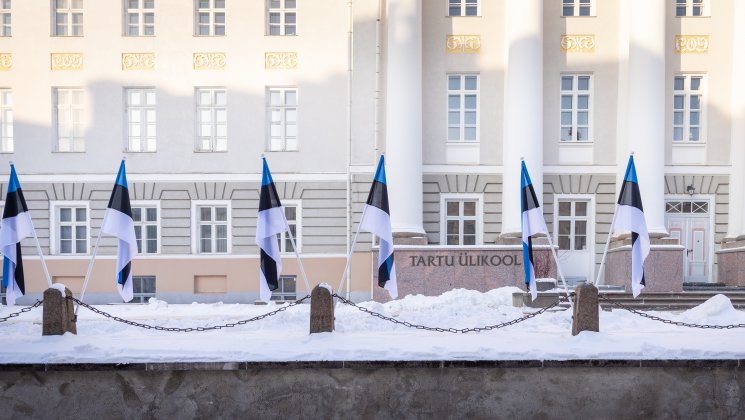Nutritional therapy specialists trained in Tartu
Last academic year, the Clinical Nutrition curriculum was opened at the University of Tartu – the only one of its kind in the European Union. Universitas Tartuensis asked its founder and leading lecturer, Professor Alastair Forbes, what a future graduate can undertake with a master's degree in clinical nutrition.
Alastair Forbes, a visiting professor at the University of Tartu, has set himself the goal of developing the field of clinical nutrition: he designed the curriculum some time ago at University College London, and now continues to improve it in Estonia, at the Institute of Clinical Medicine of the University of Tartu.
The curriculum created in London has proved successful and two other similar master's programmes have been established in the UK on its example. The European Union, however, offers no such curriculum anywhere other than at the University of Tartu. According to Professor Forbes, the curriculum here is even better than those in the UK.
“Now we have more experience to take into account in teaching. We have also made minor adjustments based on student feedback in Tartu so that the programme be even better,” he says.
Fundamentals and transferable skills
Last academic year, the first group of master's students from Estonia and Ghana started studying on the curriculum. This September, students from Kazakhstan, Norway, Pakistan and Turkey were admitted.
Among the students on both study years, four have a background in healthcare: a pediatrician, a psychologist, a dietitian and a nutritionist are here to acquire new knowledge.
The first year of the master's studies focuses, among other areas, on the fundamentals of science: the history of science, philosophy of science, and statistics. Of great importance are transferable skills that are valuable in any profession. Professor Forbes considers it important that future clinical nutrition experts are able to express themselves in various ways, make presentations at conferences and write grant applications.
In the second semester, students study nutrition in the case of specific diseases, such as analysing the diet plan of a cancer patient or a diabetic. “We teach all about diseases and what to do or not do about them, in proportion to their incidence – the diseases that are the most widespread gain more emphasis,” Forbes describes.
The focus is also on the menus of intensive care patients and on those who have undergone surgery to support their faster recovery.
The courses are given by lecturers from Tartu as well as from acclaimed nutritional therapy centres around the world. “I've agreed with the foreign lecturers that they will stay here for at least a few days,” says Forbes. “This enables students to not only listen to the lecture, but also communicate more intensely with the lecturers and expand their professional network.”
Already, students have had the opportunity to meet UK nutritional scientists Professor George Grimble and Dr Kostas Fragkos, and Danish Professor of nutritional nursing Mette Holst, all of whom are internationally recognised researchers. This academic year, Professor Alessandro Laviano, an Italian gastroenterologist who specialises in nutrition related to cancer treatment, and Swiss Professor Mette Berger, a renowned specialist in intensive care and micronutrients, will also share their knowledge.
In the second master's year, each student takes up their own research project for six months. Current master's students have done that in Tartu, but those who have come from abroad are encouraged to do research in their own country, if possible.
The research topics vary considerably: for example, one of the students studies the automation of nutritional screening, another looks for ways to improve and facilitate the diagnosis of malnutrition, while the third explores the beliefs and practices of parents regarding children's eating habits and obesity risk.
The studies also include a ten-week internship during which, however, the student takes the role of an observer because of the lack of competence to make decisions and give advice yet. The students are free to select an organisation for their internship.
“We consider it important that the student has an academic supervisor, but the internship can be done anywhere. Thanks to the length of the internship, a student can become a member of a hospital or nutritional centre staff,” says Forbes.
Curriculum for leaders
Towards the end of the master's studies, newly published research results are analysed in the context of previous courses. According to Forbes, this way students learn to critically analyse new research, including aspects of clinical nutrition, and get used to constantly keeping up with the developments in the field.
This idea comes from scientific conferences, where, in addition to the schedule early planned, some time is also reserved for discussing the latest research news.
Once the master's degree is obtained, the student has several options. Forbes says that a large number of graduates from a similar degree programme at University College London work in pharmaceutical companies and hospitals, and one graduate even became a health minister in their country.
Professor Forbes hopes that the graduates of the curriculum at the University of Tartu will become leaders in the field of clinical nutrition in their respective countries. They can secure employment as an expert and advisor in both the private and public sector: advising companies or preparing menus for hospitals, schools, penitentiary institutions, etc. Both Tartu University Hospital and the North Estonia Medical Centre eagerly welcome the graduates.
The volume of work is also large in public health policy, such as in analysing the idea of taxing certain foods and advising public authorities.
The curriculum is of great benefit to hospitals
The Faculty of Medicine has been teaching healthy eating principles to students and the public for many years, however, they have not had a designated curriculum on clinical nutrition until now.
Alastair Forbes, visiting professor at the Institute of Clinical Medicine, is a specialist with extensive international research experience, on whose initiative the master's programme Clinical Nutrition was opened last year.
Our major hospitals have expressed interest in clinical nutrition specialists, but unfortunately they have not yet sent anyone to study. We hope that in the next few years an international network of clinical nutrition specialists will be established via the University of Tartu, which will also be a foundation for the development of a research centre, involving both the nutritional scientists of our institutes and the graduates of the new master's programme.
Margus Lember
Head of Department, Professor of Propaedeutics of Internal Medicine
The article was initially published in Estonian in the magazine Universitas Tartuensis



